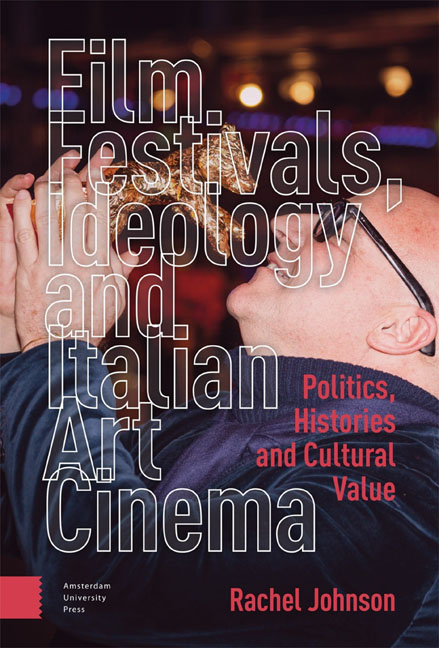1 - Film Festivals and Ideology Critique
Published online by Cambridge University Press: 13 April 2024
Summary
Abstract: This chapter outlines the book's theoretical framework and methodology. I reframe ideas of quality, taste and aesthetics through ideology—a term long present, yet under-theorised in film festival studies. I argue that rehabilitating the study of ideology is necessary for the development of rigorous, left-wing analyses of contemporary art institutions such as festivals, intervening in both the discursive and economic realities they (re)produce. This chapter adapts theories rooted in Lacanian psychoanalysis, and particularly the work of Slavoj Žižek, to examine the workings of festival apparatuses, paratexts, and cinematic excess. The methodology follows a three-tier critical procedure, bringing into dialogue festivals’ operational and material contexts, their representation of themselves and the films they exhibit, and the excessive qualities of such films.
Keywords: art cinema, cinematic excess, cultural value, paratexts, psychoanalysis
Introduction: From Quality to Ideology
In 2012, film curator Roya Rastegar announced that film festivals had entered a state of “curatorial crisis” (p. 310). With the proliferation of digital technologies for making and exhibiting films, the terms used to justify festivals’ gatekeeping of an exponentially expanding film culture were beginning to look ever more unstable. In Rastegar's article, festivals’ claim to a monopoly on “quality” shows itself as underpinned by “ideologically charged notions of taste and aesthetics” and the exclusion of “cinematic sensibilities that flourish on the margins of film culture and wider society” (p. 310). While later chapters in this book grapple with several questions that Rastegar's polemic raises—questions of exclusion and difference, national identity and the framing of the Global South—I would like to pause on the implications of bringing together these two ideas: quality and ideology. Although ideology plays only a brief (if significant) role in Rastegar's piece and, as I discuss below, remains relatively un-theorised in film festival studies, the article represents something of a culmination of debates around the mobilisation of “quality” as a vague and sometimes obscurantist term used to secure the legitimacy of film festivals in global film culture.
- Type
- Chapter
- Information
- Film Festivals, Ideology and Italian Art CinemaPolitics, Histories and Cultural Value, pp. 37 - 62Publisher: Amsterdam University PressPrint publication year: 2023



